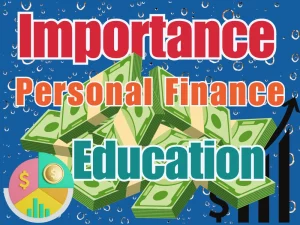Having sound financial knowledge has been identified as the best thing that can happen to anyone. The ultimate guide to financial literacy will open your eyes to another world of possibilities and a stress-free life full of achievements. What I’m going to share with you will empower you to navigate the complexities of the financial world, thereby leading you to greater financial security and success.
Table of Contents
What Is Financial Literacy?
Financial literacy is the understanding of various financial concepts, such as budgeting, investing, and managing personal finances. Or let’s say “Financial literacy is the ability to understand and effectively use various financial skills, including personal financial management, budgeting, and investing. When you are financially literate, you have the foundation of a relationship with money, and it is a lifelong journey of learning”. Sources: Investopedia
The Importance of Financial Literacy in Everyday Life
Financial literacy is important because it assists people in becoming self-sufficient and financially stable lives. It empowers people to take control of their finances, make informed choices, and plan for a secure future. When you acquire financial literacy skills, you’ll be equipped with what it takes to effectively manage your income, savings, and investments. Acquiring financial knowledge helps you avoid debt, make smart purchasing decisions, and handle unexpected financial emergencies easily.
Foundations of Financial Literacy
It is very important for you to understand basic financial terms and concepts, like every other thing in life, learning the basics is like laying a good and strong foundation for a better and stronger tomorrow.
To become financially literate, you need to familiarize yourself with the basic financial terms and concepts. These include understanding the difference between assets and liabilities, the concept of compounding interest, and the various types of financial instruments such as stocks, bonds, and mutual funds. Learning and understanding these concepts will give you understanding and arm you with all you need to engage in financial discussions and make informed decisions.
Key Principles for Achieving Financial Success
There are several key principles that contribute to achieving financial success. These principles include living within your means, the importance of saving and budgeting, and maintaining a diversified investment portfolio. Take these principles and concepts seriously if you want to build a solid foundation for their financial well-being.
Common Misconceptions about Personal Finance
I have come across many people who have misconceptions surrounding personal finance that have frustrated their financial literacy. Some of these misconceptions are the belief that a high income guarantees financial security, or that investing is only for the wealthy. The earlier you do away with these misconceptions, the earlier you’ll be able to develop a more accurate understanding of personal finance and make better financial decisions.
Budgeting and Managing Personal Finances
Creating a realistic budget that aligns with your goals is the key to your financial success. One of the fundamental aspects of financial literacy is creating a realistic budget. A budget helps you to understand your income, expenses, and financial goals. Listing all sources of income and tracking expenses will give you the opportunity to develop a budget that aligns with your financial objectives. Don’t forget that a well-planned budget will pave the way for saving, investing, and managing expenses effectively.
Tracking and Controlling Your Expenses Effectively
Effective expense tracking is a key factor responsible for maintaining financial stability. By keeping a record of all expenses, you should be able to identify areas where you can cut back or reduce unnecessary spending. Using expense-tracking apps and tools can simplify this process and provide a clearer picture of one’s financial situation.
Strategies for Saving Money and Reducing Debt
Saving money is a key component of financial literacy. It involves setting aside a portion of income for future needs and emergencies. You can employ strategies such as automating savings, setting realistic financial goals, and reducing debt to improve your financial health. You also need to understand interest rates and debt management techniques, you’ll be surprised this will position you on the right track to develop a plan to pay off debt and achieve financial freedom.
Building and Maintaining a Strong Credit Score
The importance of a good credit score cannot be overemphasized, it’s one of the major factors for achieving financial success. It has a direct effect on your ability to secure loans, obtain favorable interest rates, and even qualify for certain job opportunities. Understanding how credit scores are calculated and being aware of your own credit standing will enable you to make informed decisions that positively impact your creditworthiness.
Tips for Building and Improving Your Credit Score
At this point, I’d like to let you know that building and improving a credit score requires responsible credit behavior. Some of the tips for achieving a good credit score include: Paying your bills on time, keeping credit utilization low, and regularly reviewing credit reports for errors. By adopting these practices, individuals can gradually improve their credit scores and enhance their financial prospects.
How to Manage Credit Responsibly and Avoid Common Pitfalls
Managing credit responsibly involves understanding the terms and conditions of credit agreements, avoiding unnecessary debt, and making timely payments. Please always pay attention to interest rates, credit limits, and fees associated with credit cards and loans. If you exercise caution and make informed decisions, you should be able to avoid common pitfalls associated with credit misuse
Investing and Growing Your Wealth
Investment is a powerful tool for growing wealth and achieving financial goals. You need to understand different investment options, such as stocks, bonds, real estate, and mutual funds, doing this will avail you the opportunity to make informed investment decisions. You should be able to determine the most suitable investment strategy for their needs if you consider factors such as risk tolerance, time horizon, and financial goals.
Understanding Risk and Return on Investment
Investing involves taking risks with the aim of generating a return. Understanding the relationship between risk and return is critical to successful investing. You should also think of diversifying your investments, this is very important, as it would enable you to mitigate risk and potentially increase your overall returns. It is important to assess risk tolerance and seek professional advice when necessary.
Strategies for Long-Term Wealth Accumulation
Long-term wealth accumulation requires consistent and disciplined investment strategies. These may include dollar-cost averaging, where regular investments are made regardless of market conditions, and investing in tax-advantaged retirement accounts. Adopting a long-term perspective will enable you to maximize your wealth accumulation potential and work towards financial independence.
Retirement and Financial Planning
Planning for retirement is a key factor in financial literacy. It involves assessing your financial goals, estimating future expenses, and determining the savings required for a comfortable retirement. You also should consider factors such as inflation, healthcare costs, and desired lifestyle. Starting early and regularly contributing to retirement accounts are essential for building a secure retirement fund.
Retirement Savings Options and Considerations
There are various retirement savings options available, such as employer-sponsored retirement plans (e.g., 401(k)), individual retirement accounts (IRA), and annuities. Each option has its own features and considerations. Understanding these options and evaluating their suitability is critical for effective retirement planning.
Assessing Your Financial Goals and Creating a Personalized Plan
Financial goals vary depending on an individual’s circumstances and aspirations. Assessing personal financial goals involves determining short-term and long-term objectives. You should consider prioritizing goals, creating a budget, and consulting with financial professionals. Doing so would make it possible for you to develop a personalized plan that aligns with their vision for the future.
How to Make Informed Financial Decisions
When making financial decisions, it is very important to evaluate the various products and services available. This includes assessing interest rates, fees, terms, and conditions associated with banking, loans, and insurance products. By comparing options and understanding the fine print, you will be able to choose the products that best meet your needs.
Understanding Contracts and Fine Print
Contracts often contain important details and legal obligations that you should be aware of. It is recommended that you understand the fine print before entering into financial agreements, e.g. loans or insurance policies. In order to avoid potential pitfalls, always remember to seek legal advice when necessary.
Avoiding Scams and Making Empowered Choices
Financial scams can be detrimental to your financial well-being. It is very important to be aware of common scams and fraudulent tactics, such as phishing emails, pyramid schemes, and identity theft. Stay informed and exercise caution as much as you can.
Ensuring Financial Security and Risk Management
Financial security involves being prepared for unexpected events. Managing insurance coverage for health, property, and life will protect you against unforeseen circumstances. Try having an emergency fund that covers three to six months of living expenses and provides a safety net during times of financial strain.
Protecting Yourself from Unexpected Financial Crises
Financial crises can occur due to job loss, health issues, or economic downturns. To protect yourself against such events, you should have a well-diversified investment portfolio, maintain an emergency fund, and consider appropriate insurance coverage. Be proactive and prepared, so you can minimize the impact of unexpected financial crises.
Understanding the Importance of Estate Planning
Estate planning involves determining how assets will be distributed upon one’s death. It includes creating a will, establishing trusts, and designating beneficiaries. By engaging in estate planning, you can ensure your assets are distributed according to your wishes and minimize the financial burden on your loved ones.
Teaching Financial Literacy to Children and Teens
The importance of early financial education cannot be overemphasized, instilling financial literacy skills at an early age is crucial for the future financial well-being of children and teens, and this should be our primary responsibility. Teaching them the importance of saving, budgeting, and making informed financial decisions sets a strong foundation for a lifetime of financial success. Financial education should be integrated into school curricula and reinforced at home.
Age-Appropriate Strategies for Teaching Children about Money
Financial education for children should be age-appropriate and tailored to their level of understanding. Younger children can learn about the value of money through simple savings goals and allowances, while teenagers can be introduced to more complex concepts such as budgeting, investing, and the importance of credit scores.
Supporting Teenagers in Developing Strong Financial Habits
Teenagers who develop strong financial habits are better equipped to make wise financial decisions as adults. By encouraging part-time jobs, emphasizing the importance of budgeting, and teaching them about debt management, parents and educators can help teenagers become financially responsible individuals.
Navigating Student Loans and College Financing
Student loans are a common method of financing college education. Understanding the types of student loans available, such as federal loans and private loans, is crucial for making informed decisions. Understanding interest rates, repayment options, and loan forgiveness programs would enable you to minimize student debt.
Strategies for Minimizing Student Debt and Repayment Options
Minimizing student debt involves exploring alternatives to loans, such as scholarships, grants, and work-study programs. It also includes developing a realistic budget for college expenses and researching repayment options. By being proactive and strategic, you should be able to graduate with less student debt and establish a healthier financial future.
Exploring Alternative College Financing Methods
College financing methods extend beyond traditional student loans. Exploring alternatives, such as employer tuition reimbursement programs, community college transfers, and apprenticeships, can provide you with additional opportunities to fund your education. Try as much as you can to research and consider all the options we have mentioned so far.
The Role of Technology in Personal Finance
Financial technology, or fintech, refers to technological advancements that have revolutionized the way we interact with our finances. Fintech includes various applications, software, and digital platforms that simplify financial management and transactions. These technologies have made it easier for us to budget, invest, and track our financial progress.
Benefits and Risks of Utilizing Financial Apps and Tools
Financial apps and tools offer numerous benefits, such as convenience, real-time access to financial information, and automated budgeting features. However, it is important to consider the risks associated with sharing personal financial data and the potential for reliance on technology. Incorporating financial apps and tools with prudence would enable us to harness the benefits while minimizing the risks.
Incorporating Technology for Improved Financial Management
Utilizing technology can enhance financial management practices. By using budgeting apps, investment platforms, and online banking services, you would make you gain a better understanding of your financial situation and streamline your financial activities. Technology can also aid in automatic bill payments, setting financial goals, and monitoring progress towards those goals.
Success Stories: Real-Life Experiences of Financial Transformation
Read and digest as many inspiring Stories of people who have achieved financial success as much as you can. Real-life success stories serve as inspiration for those on the path to financial literacy. These stories often highlight the journey of people who overcame financial hardships by implementing sound financial management strategies. Their stories showcase the power of perseverance, planning, and discipline in achieving long-term financial success.
Lessons Learned from Their Journey
Success stories provide valuable lessons that readers can apply to their own financial journeys. Key takeaways may include the importance of setting financial goals, building an emergency fund, and investing for the future. Learning from the experiences of others can steer you in the right direction and motivate you to improve your financial well-being.
Motivation for Your Own Financial Transformation
Reading about the achievements of others can ignite motivation and encourage you to take control of your own financial future. Success stories offer hope and demonstrate that with dedication and the right knowledge, anyone can transform their financial situation. They inspire people to believe in their ability to achieve financial success.
I am convinced that by now you must have learned enough to steer you on the right path to your financial success. Remember, financial literacy is key to navigating the complex world of personal finance. “The Ultimate Guide to Financial Literacy” is the best resource you’ll ever find online. As you can recall, so far, we have discussed many vital points, and I believe this has increased your understanding of financial management, from basic financial terms and concepts to making informed financial decisions, each aspect contributes to building a strong financial foundation.
Key Takeaways from the Guide
- Financial literacy is critical for you to make informed and effective financial decisions.
- Creating a realistic budget, managing personal finances, and reducing debt are vital components of financial literacy.
- Building and maintaining a strong credit score is important for financial success.
- Investing and growing wealth requires understanding different investment options and managing risk.
- Retirement and financial planning ensure a secure future.
- Making informed financial decisions involves evaluating financial products, understanding contracts, and avoiding scams.
- Ensuring financial security and managing risk through insurance and emergency funds is essential.
- Teaching financial literacy to children and teens lays the foundation for your future financial success.
- Navigating student loans and exploring alternative college financing methods help minimize student debt.
- Technology can play a significant role in improving personal finance management.
- Real-life success stories inspire people to transform their financial situations.
Steps to Start Unlocking Your Financial Potential Immediately
- Take the time to educate yourself on financial literacy.
- Analyze your current financial situation, including income, expenses, and debt.
- Create a realistic budget that aligns with your financial goals.
- Start tracking your expenses and find areas where you can save money.
- Work on building and maintaining a strong credit score.
- Explore different investment options and consider seeking professional advice.
- Plan for retirement by assessing your financial goals and considering savings options.
- Evaluate financial products and services carefully before making any decisions.
- Protect yourself from unexpected financial crises by having insurance coverage and an emergency fund.
- Teach financial literacy to your children and support them in developing good financial habits.
- Research student loan options and alternatives for college financing.
- Incorporate financial technology tools and apps into your financial management routine.
- Seek inspiration from real-life success stories and learn from their experiences.
- Stay motivated and committed to improving your financial situation.
FAQ about Financial Literacy
- What is the best way to start learning about financial literacy?
- Starting with reputable personal finance books, online courses, and educational resources can provide a solid foundation. Seeking guidance from financial advisors or attending workshops can also be valuable.
- How long does it take to become financially literate?
- Financial literacy is an ongoing learning process. The duration depends on an individual’s commitment to learning, available resources, and the complexity of their financial goals.
- Can I achieve financial freedom regardless of my income level?
- Financial freedom is attainable at any income level. By managing expenses, saving, and investing wisely, individuals can work towards financial independence regardless of their income.
- What are some common mistakes to avoid when managing personal finances?
- Common mistakes include overspending, not having an emergency fund, ignoring debt, and failing to properly plan for the future. It is important to avoid impulsive financial decisions and seek professional guidance when needed.
- How can I improve my financial literacy as a senior citizen?
- Senior citizens can attend workshops, read books on retirement planning and investment strategies, and seek advice from financial professionals who specialize in retirement planning. It is never too late to enhance financial literacy and make informed financial decisions.




